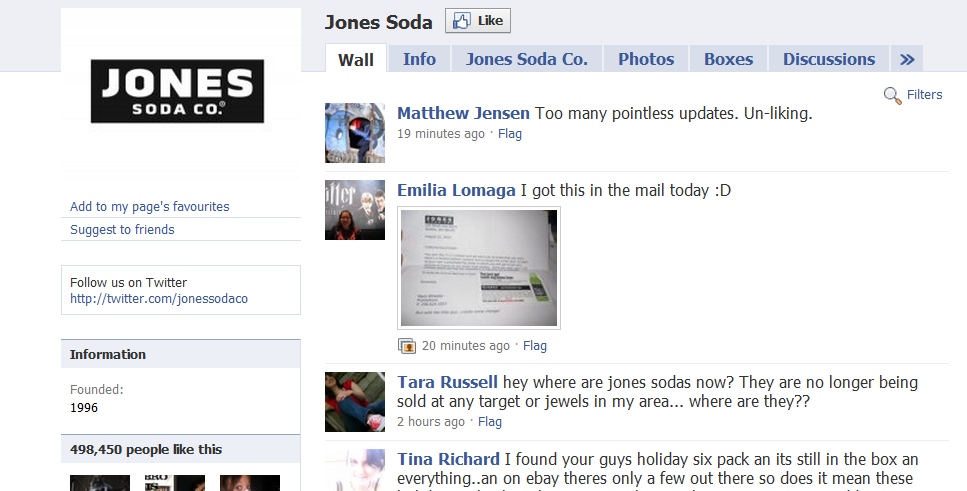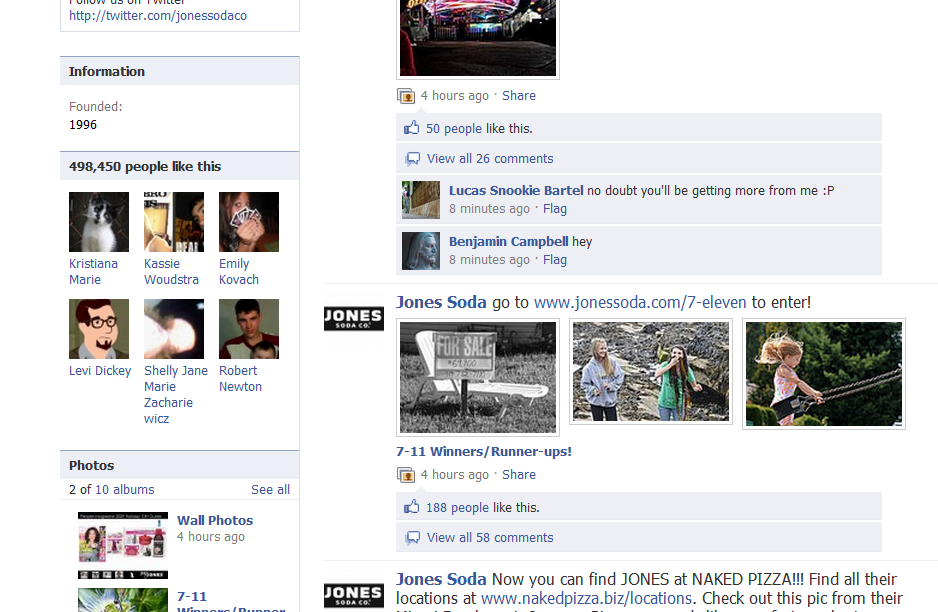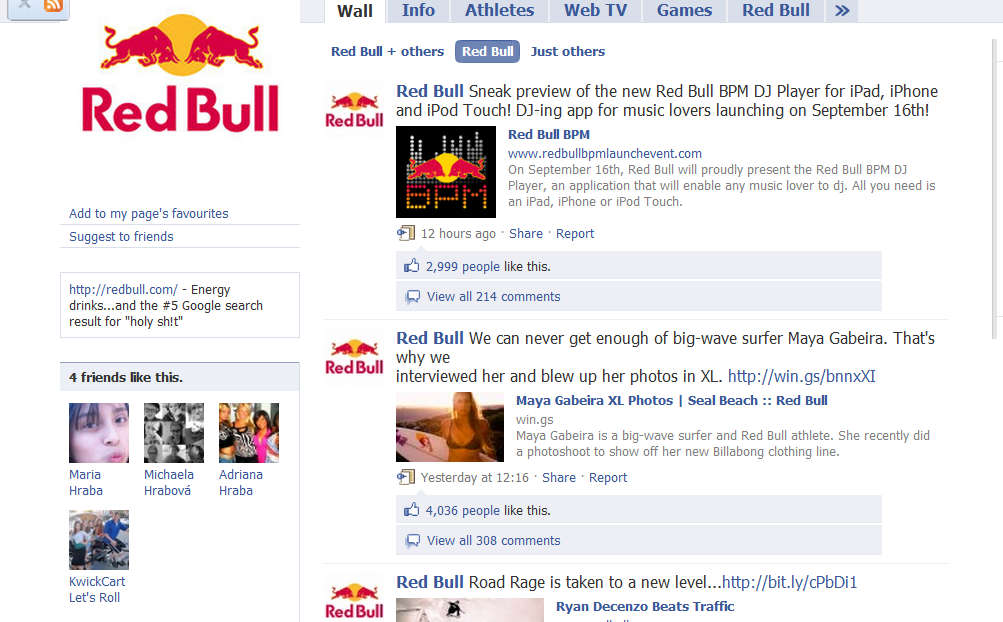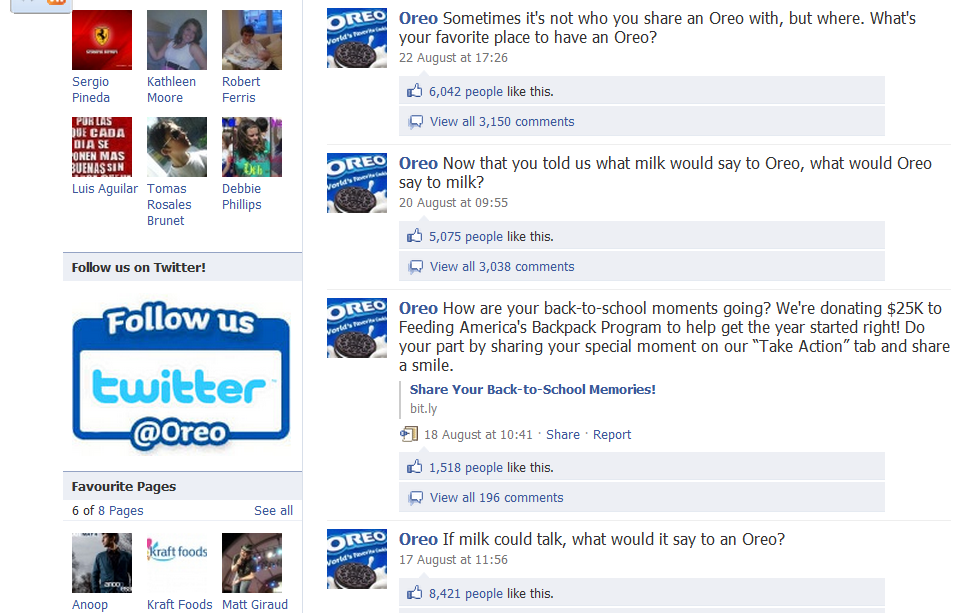What does it all mean? (that link is a funny Youtube clip, as a palette cleanser).
Depending on how this one goes, I think this is my second to last or last post *ever* haranguing on, or thinking this deeply about, Facebook. Â Blue in the Face makes one look crazy, especially if no one is listening… and beyond the simple fact that I may be wrong, and happily eat humble crow as I become more aware….. I do see some meaningful interaction on Facebook. Â It takes some time, and for me it took *opening* my network. Â This concept of a “closed” network seems bizarre to me, and it limited real, meaningful interaction, the likes of which I remember from IRC or topical boards.
You have seen me talk about this in regards to Hospitality Brand’s respective Facebook Pages, and the lack of real interaction… even when they are done well. When it comes down to it, there are some problems with the way Facebook Pages work.  This post is, to some degree, a slapdash missive of a rebuttal to this post about the Top Ten Facebook Brand Pages.  There are 100’s of those “top 10” posts, but it’s a good post with some interesting thoughts… and they are the perfect pages to “pick apart”, so to speak.  I want to ask some questions (that I don’t have any answers to) that result from crunching interaction numbers, informally, as well as gauge what it means to have a “fan”.  Hopefully it sparks conversation?  I also want to delve into why there are real challenges for creating that meaningful interaction Facebook Pages.
Before we start looking at the nature of these brand page interactions, we need a little background on what Facebook is. First, Facebook’s narcissism problem is duly noted, and it means that Facebook users will wear a brand Page like a pair of Chanel glasses or Dolce purse. Â In the Facebook universe, where interaction is “me” first, the network later, much (not all) of brand interaction is selfish, opportunistic, and all for show. Â It isn’t at the brand’s convenience (nor should we expect consumers to act like that), so much as being an emblem for the consumer, and not something they expect to have a real relationship with. Â In fact, I talk passionately about how bizarre “hiding streams” is within Facebook, and how that effects the way we post, the attention we lost, and the importance of curating it. Â For example, the above “top brand pages”, while researching this article, had this post, right by the brand name:

I think it might suggest, based off the “Top Ten Brand Pages” article, that we need to look at how we interact with our communities. Â It’s only one example, but at least they said something. Â If stats are right, 70-90% of other people didn’t say a word and just hid their wall posts from view, forevermore. Another reason I won’t be posting much more about this Facebook nonsense: I sound like a broken record, stuck in a rare groove. Â But as I have said before…. People are just understanding the crisis of perception in social media: it’s not about the “me”. It is about everyone else. In general, no one gives a hoot about your photos of dinner, your baby, your vacation (not to be dour; just grumpy hyperbole to pilot an idea into the harbor). Â It makes people look arrogant and self absorbed – back to the narcissism study. Â Of course, there are *many* *many* Facebook users that are *not* like that, and you are probably one of them.
Those who spend time on the meta level of social tech (IE not the ones who respond, when you are looking for a conversation, with “internetz iz serious bidness”) are definitely not the ones passively or flippantly interacting, nor the 70% who are simply “lurkers” or people that do not actually interact.  That data is from Forrester’s Groundswell, a book I suggest you pick up.  This recent article talks about 90% non participants who exist to consume information, and links to this article has data on the idea that 90% lurk. As I mentioned in a previous post, “lurkers – we know you are out there eating our posts” Social media works best when it is about EVERYONE else… real communication, real collaboration.  For example, you should be able to view this thread from my profile.  Instead of talking about me, I asked what they did. There wasn’t just *more* interaction, but it was personal, meaningful, and more robust than one off comments on viral videos like “lol” or “That’s great”.
The “Like” button is an activity and concept that I can wrap my head around, but it becomes incredibly frustrating when you realize Facebook’s attempt to hook itself into the framework of the internet leads to the single most passive social interaction that has ever existed, and that’s going to be an issue for brands and pages.  At least, it might make us take stock about what we really know about Page usage, and if it’s better to sit silently, curate attention, and post only when vital.  Allow people the pleasure of brand advocacy, and comment and follow up when necessary…. but it may be that our forced excitement and expectation in using these tools is putting off our consumers. If everyone focused on the network, instead of, naturally, being more self interested… think of the level of real interaction that would create between people, brands, and one another?
Herein lies an obvious problem, of whether it is my place to even suggest that people should change their underlying instincts or natural patterns in how they interact. Â In fact, I could be trying to yoke a powerfully ingrained genetic compulsion.
One person is simply a node… and nothing else. If Oprah or Ashton dropped from Twitter, all that would happen is that the network map would fill itself. People do not matter… it’s the network that matters. It’s about the multiple nodes, weak ties, and flow of ideas and communication…. and one node could disappear without a blip. Cancel your facebook account and see how much it actually effects your network. Â An important issue is that, if you start hiding streams in Facebook, in my opinion, it may make the network unstable, or at least, less meaningful. Â Weak ties are less obvious to the network, and this PDF (following link autodownloads) of Granovetter’s “Strength of Weak Ties” article has some pretty amazing conjecture about them being markedly important in regards to Network Science. It’s a big problem even judging how many eyes on your page.
As soon as people realize this, we will start using social tools in a more intelligent and organized way. Â To defer potential conceit on my part, I want to remind anyone reading this that you are likely ahead of the curve as well, and I am unabashed in suggesting that users need to mature somewhat before these tools can reach their potential. Â The Read Write Web login debacle might be proffered forth, yet again, as evidence of Facebook, or Google, users’ relative dimness as to how to use the internet. Â Of course, the point can be said is that it’s Google and/or Facebook’s fault because they need to be able to explain this stuff to users.
These social conversation tools are the single biggest shift in human communication in history, and people are taking photos of amuse bouche or retouching a vacation shot to make other people jealous…. the same other people who aren’t actually looking at another person’s page because they are quite busy acting like a star on their own page, hoping people notice *them*. Â Facebook’s potential competitor from Google is tentatively named “ME” – well played Google. Is that deliberate, guys?
I wouldn’t spend my time on this, but I am somewhat irked that everyone has shrugged their shoulders and said, “I guess Facebook is as good as this will get,” and are, again, allowing FB to hook itself into the framework of the internet. Â It’s a difficult proposition for me. Â It’s quickly becoming bigger than a monopoly (a linked article that comments on the fact that the internet is *incredibly* well linked, interactive, and stable *outside* of Facebook). Â If Facebook becomes the internet, some form of public utility that is not removable from the architecture of the internet, that is a big problem. It stifles creativity, and competition cannot exist in an uneven market like this. Â Even with a smattering of bungled launches or app experiments that have gone viral (like Wave), Google needs to knock it out of the park with the competitor. Â I am not so sure someone is in the position to really compete.
I have some ideas for Google Me… maybe it’s simply my own network I am talking about. Â Could you imagine a social network based off of proximite geo-community, hyperlocality, and topical interests…. rather than some wholly arbitrary closed network that allows you to conntect to 20 year dead contacts that are as arbitrary as having a locker near them in grammar school? Â If anyone wants to help build it, inquire within. Â I sure as hell can imagine it. =) But the real point isn’t this complex new science of networking, nor is it the immediate issues with the existence of Facebook. It’s the existing interaction and community that is really happening around these brands.
Let’s look at Jones Sodas first, since we unfairly took a one in a million negative comment that I barely caught upon their profile.

So in this one snapshot (which is hardly enough to make this a proper study) – the first post has .0001003 / .01003%  likes, and .0000522 / .00522% comments.  What is a normal impression, or what is expected of 90% non contributors?  The second post has .0003772 / .03772% likes, and .0001164 / .01164% comments. I only include the percentages, because there is a HUGE difference between .037% interaction vs how people sometimes look at a number that small..contes. 3.72%.  It’s the former, and that’s tiny.

At the time of my post, Redbull has 7,957,179 fans. Pardon me for not having it in this picture. Â That’s about the population of London or Chicago. Â The two interactions showing have interaction rates (this is not even a standardized metric, by any means.. but it illustrates a strong point) as follows: Â #1 = .0003777 / .03777% “likes” and .0000269 / .00269% commented. Â #2 (sex sells) = Â .0005072 ‘likes” and .0000387 / .00387% commented.
I was going to go through this for the entire list of 10, but you may understand my point (that I am, sloppily, beating into the ground). Â I will do one more, as I already did Burt Bee’s interaction info on Twitter, as well.

At the time of posting 9,084,488 people “liked” the Oreo fanpage. Â In the above, .0005586 / .05586% liked (a little more than one twentieth of one percent or 1/20%) and .0003344 / .03344% commented, the second posting was .0001671 / .01671% liked and .0000216 / .00216% commented.
I think you get the point…. even the most successful brand pages are creating interaction and real community involvement that is such a small percentage of their supposed community, we have to ask how this actually works?
I understand it’s a distribution channel, and you need to be available to guests and consumers that wish to interact with you on their own terms in their own comfort zones…. but numbers this small are almost impossible to fathom. Â The way people are prostelytized by brands, I, personally, would imagine interaction levels much higher… at least into whole percentage points. Â Is this Facebook’s fault? Â Is this something greater involving the crisis of perception in social media?
More questions: Is having a contest that garners fans on your page a good measure of a potential consumer? Â Are you attracting consumers that like contests, or consumers focused on the quality of your brand? Â Is gaining a fan more important than interaction and community? Â When you discount on a Facebook page, are you giving back money to a branded consumer that was already prepared to pay full price? These numbers are similar across the board, and I see endless smaller brand or hotel pages that don’t have a powerhouse of a community to energize. Â Should we spend our time on this? Â Should we spend our time on this …. *yet*?
Henry Harteveldt’s sage wisdom was so simple and zen: Â “Give it time.”
The Twilight Fan Page on Facebook has over 12 million fans… that’s the population of Calcutta or Los Angeles. Â But, interaction levels are about the same, as they are for all major brands. Â Crunch the numbers yourself, it’s fairly easy.
I am not claiming this to be a bona fide metric, but it begs some very important conversation. Â Is this simply a wiki page for your brand advocate’s to show off their incessant narcissism – more about how you make them look & feel, rather than wanting a connection to a community? Â If that’s the case, how much energy and time (and labor dollars) does a hotel invest on this brand advocacy versus legitimate conversation?
My main question is this: (as I sit and panic, and quandry, and furrow my brow):
Are numbers this small to be expected?
In the world of hard to track impressions and marketing measurements that dp provided a modicum of data and guidance (however skeptical I always am) – some people have said, “so what, who cares, it’s to be expected”.  But numbers *THAT* small?  Is that part of the Pareto Efficiency, or does the principle come into play (if you believe in that)? I am not saying you shouldn’t be on Facebook with a page, but what are we trying to do? This isn’t meant to be about misery or confusion, but I would quite like to see a conversation struck up about this.
What do you think? Â I would love to know!
ED Note: A couple new articles in the past few days.
70% of FB users that have “liked” your page do *not* consider that permission to market to them. Â Hey… I am on your side. That’s just idiotic.
And there are other “virtual crumedgeons” out there… fairly intelligent ones. In that link, the Economist reviews Jarod Lanier’s new book “You are not a Gadget”.
It’s nice to know that the 100% solar, 100% off grid Wilbur Hot Springs has seen this market opening up for some time… the unplugging escapists. Â They highlight a number of fascinating New York Times articles here, and make a case for backing off a bit. Your brain on computers, indeed. See you at Wilbur. Â (Full disclosure – I put that piece together for them).
Ed Note (7th Sept 2010):
Chris Brogan’s “The Coming Social Crash” article is interesting… about the impending mass step back from all these overwhelming tools.
But I stumbled on this today, and thought it was far too relevant to not attach. Â I love the analogy of the story of social networking… but “Have we lost the plot in social networking?” Â Some of the questions raised in that article are profound. Â Can you really be #1 simply because you *are* #1? Â How long is that model going to work for them?

Facebook does reflect the need for people to define their identity. The “likes” are just another form of social marker serving to tell others which group one belongs to. It serves to keep one safe. The problem is that with people reaching out into the undefined space of the cyberworld this normal social behavior is distorted. The question for me is how are human beings going to manage the millions of signals from an undefined group? Looks like the initial reaction is self absorption rather than an orientation toward other.
I don’t care much about my blog post… but if it can start even one post or conversation with thoughts like yours…. it’s refreshing, and makes me happy, at least. =) I am concerned about this “like” because it is a flippant, errant gesture, and I am aware that people hit it so casually that they realize, 3 pages on, that they didn’t really like the thing they just clicked. It’s that fast and unconscious. As this data aggregates, the extraordinary amount of information will not only be difficult to filter, but it will be difficult to decipher. There’s no depth, and it’s tantamount to someone saying “I love my wife” & “I love my popcorn”. There’s an obvious difference, but when it gets into “I like travel” or “I like ice cream” it’s much harder to weigh those “Likes” and therefore REALLY hard to find it a meaningful metric. It’s passive, it’s thoughtless, and it doesn’t have much value other than to try to cement FB into that framework.
It makes interaction with brands and, in my case hotels, so meaningless that I just can’t imagine this being the end of the line for social comm tech.
But are you saying that, outside of Facebook, the “like” metric is even more difficult to track, or is it that the action of liking by an end user is almost meaningless because the action and metric of doing it hasn’t been defined to any degree?
As for managing those signals… it’s a vital point. There’s a problem with user generated review sites (MAYBE.. my poorly tested theory) – when you reach a certain level of reviews, the thrilled and angry seem to cancel one another out and even the most stellar of restaurants average out to 3 stars or in the middle. I am not sure if this a mathematical likelihood, but when you have a glut of information, it sort of just washes over people no matter how accurate. The “Like” is experiencing this, a bit, and albeit marketers and data-agents will be happy to test market highly targeted keywords…. I just think they will be so meaningless that people won’t identify with whatever cynical tricks modern advertising will make. At least, so many people have “liked” so many ridiculous things throughout the net, it’s just going to be meaningless.
People say I take FB too seriously. Maybe or maybe not. “The internet is serious business“? It’s not FB that I take seriously. It’s everyone’s faltering sanity that is buying into this as the last great thing. That’s what I take too seriously.
As an self defined “Average Joe” who joined Facebook years ago as a way to communicate with extended family and easily share photos and videos of my family with them, I became engrossed in the “re-connecting” with those “locker mates” and people I chose long ago not to stay in touch with. Once connected I was quickly reminded why I so readily lost those connections as the many personalty traits that drove me away (or my traits that drove them away) quickly reappeared only magnified. I “unfriended” many of these people only to find other friends recommending I become friends again I quickly lost the attraction to what Facebook would do for me…moved on to Picasa! Yes, I have liked a few brands but I have not followed a one, even though I do actually like them.
So then FB came into my workplace, as a hospitality professional everyone in my field was excited about the opportunity to communicate directly to our guests through Facebook. While I was skeptical I did think it was an interesting opportunity and one I was not going to leave undiscovered. So I put together a forward thinking group of leaders at the resort and we got started. Photos, videos, staff interaction and we were doing okay; hundreds of fans and a lot of people telling us and their friends how great we are. This became an ego project and wasn’t getting us the interaction we had thought but hey people “liked” us! That was not enough, we wanted more! So this forward thinking team we put together dragged me kicking and screaming and gave away a weekend stay if you became a fan. This lead to thousands of fans and a lot of comments on our board stating “please pick me”; again no real interaction just people seeking a free trip.
Not feeling that was successful we thought we should seek more interaction so we decided on yet another couple giveaways, but this time it would require submittal of a photo or video. We received a handful of responses but really if you submitted something you had a really good chance of winning as very few made any effort. This is when I decided that a Facebook page became a responsibility as another marketing outlet but not the communication with our guests I had hoped and dreamed.
So what happens next? Tripadvisor, Yelp, etc. all provide a fair give and take. Forums offer a real communication option but unless you are an active contributer you will most likely be seen as an outsider just marketing your wares. The only way I can think of beating this is to be a regular contributer on thousands of boards and who has time, really?
I really like the idea mentioned of a local based network that cares for the day to day parts of our lives (local dining, events, social sub-groups, advice, news). Then, when we do travel or want advice from outside our network you look into these non-local (to you) worlds and ask a few questions as a clear outsider but with attached credentials of contributions in your home network. Mr. Hraba, I think we need to quit our day jobs and get this start-up going…wait, do you even have a day job as everything I see from you happens in the wee hours of the night?
My first response was “I am going to tell your locker mates on you”, but that might be a bit juvenile. =)
All I know is I have a job, and I am thankful for it. Could you imagine us trying to build a new, better, more powerful series of tubes? It would be all masking tape, glue, toilet paper rolls and straws. I think we need help. =)
Excellent post. I think the problem is no one wants to stop, slow down, and think – period.
You have no idea how much that means… thank you. a) it’s hard to get these sort of ideas in front of a lot of people… no one wants to stop and slow down and think about it. 500 million users, but what’s really happening? I just love knowing someone is reading it, and the thoughts hit home. Thanks much. Cheers.
3 NY Times articles coupled with 1 Economist article:
http://wilburhotsprings.tumblr.com/post/1015407257/letsescapetogether
That stuff is epic. I am not sure I linked that in the social crash, but it’s terrifyingly relevant. =)
Attention and memory is fractionalized and marginalized. When we unplug, we heal – but we never escape or take proper vacations. It’s important stuff. Time to buy a plot of land, build an eco house, and farm for me and my family. =)